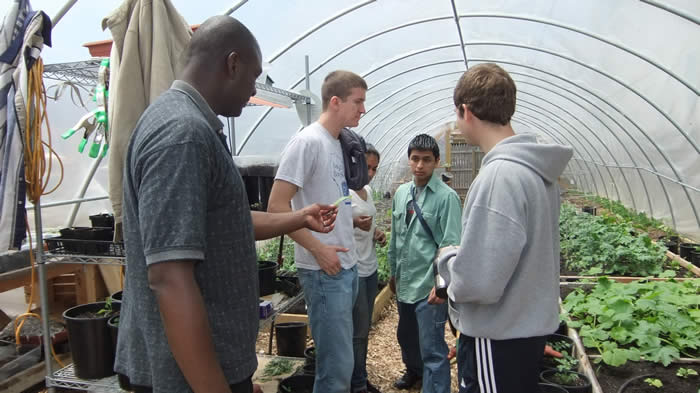Service Project Archive
Senior Project 2025
The project proposal was to fundraise and create a pipeline of facilitators to support Rainbows for All Children. This goal was accomplished by increasing awareness of child mental health needs in the Northwestern community, building mutual reinforcing partnerships with community stakeholders, and raising money to train future facilitators. The cohort's mission was to establish a pipeline of engaged facilitators and foster connectivity between like-minded community partners.
The Brady seniors represented various facets of Northwestern and were committed to serving the Evanston community. By partnering with Rainbows for All Children, they aimed to bolster their efforts and contribute to their mission to support children experiencing loss. They also facilitated meaningful connections between Northwestern students and local youth and families in Evanston. They engaged Northwestern student organizations with public service missions, to spread awareness about Rainbows for All Children and encourage students to get involved. By partnering with community stakeholders such as faith leaders and teachers, the Scholars were able to lay the groundwork for an enduring pipeline of Rainbows facilitators.
Senior Project 2024
The Brady class of '24 wished to forge meaningful connections between Northwestern volunteers and local organizations dedicated to addressing homelessness. Their mission was to establish a pipeline of engaged student volunteers within the community, striving to make a positive impact in Evasnton.
The cohort focused their efforts on three overarching objectives: volunteering, fundraising, and sustainability. They developed the Housing Security Collaborative, a registered student organization on campus run by members of the Brady Class of '24.
The experience of volunteering in places where they wanted to make a difference was broadening. Getting out of the classroom and into the community gave them a clear view of what the unhoused population was up against. The students were realistic about their limitations and donated time and financial resources to improve conditions. They partnered with Evanston-based Connections for the Homeless, which specializes in case management, financial assistance, supportive and transitional housing for people moving out of homelessness, shelters, drop-in clothing rooms, and advocacy work.
Our scholars also worked with Good News Partners, an organization that provides homeless individuals aid in steps along the “affordable housing continuum” to achieve housing independence, starting with their single room occupancy (SRO) style interim shelter, called New Life Interim, where individuals can stay for up to 120 days. There, GNP provides individuals many resources such as case managers, job counseling, and aid in receiving medical care/medications in the goal of pushing them forward to transition to independent housing.
Senior Project 2022
The Class of 2022 proposed a plan to develop a volunteer program for Northwestern students at the Moran Center for Youth Advocacy in Evanston. This goal was accomplished by streamlining the volunteer onboarding process and creating an outreach network and materials for volunteer recruitment at Northwestern University. Our vision was to improve legal aid access in Evanston and our mission was to increase collaboration between Northwestern students and the greater Evanston community.
Senior Project 2021
The Class of 2021 worked with Back on Their Feet Evanston, a Facebook group that connects Evanstonians with resources including furniture, toys, and clothing. Together they created a new database for Back on Their Feet which was set to automatically inform requesters and those offering goods, about a resource match.
The seniors also worked to improve connections between Back on Their Feet and Northwestern University, in particular, with student organizations.
Together with the organization leadership, the cohort created surveys for users to help streamline communications, which can be difficult to navigate with the abundance of posts on Facebook. The survey also identified potential members interested in helping the organization.
Senior Project 2020
As they thought about the senior project, the class of 2020 was inspired by the political climate, characterized by spending cuts to social welfare programs and the rise of xenophobia, rendering refugees trying to make a home in the United States especially vulnerable. The limitations of current relief efforts headed by local governments and resettlement organizations could be seen in both their strategies and their resources, but had proven to be particularly inadequate for providing long-term assistance to adult refugees attempting to navigate American life. Specifically, the critical needs for adult refugees to secure jobs, develop financial literacy, and acquire conversational fluency in English, among others, motivated the Brady 10’s to tackle the issue of refugee resettlement. Under a value framework which prioritized the promotion of well-being, coupled with the moral constraint for non-refoulement towards our neighbors escaping injustice from beyond the borders, they believed that they had an ethical obligation to work towards creating better living conditions for refugees in Evanston and beyond.
Because of the pandemic, complications surrounding their work on this project forced the class to adjust their plans. Their intention was to work in partnership with Northwestern faculty, COMPASS and the Refugee Knowledge Hub to develop and administer learning content designed to provide foundational skills in the “business of life” to refugees through a method of action research. This would have required that the cohort attend weekly meetings with members of the target population to aid and improve their transition into the Evanston community. Unfortunately, they seniors had to reverse course when they realized that the partnership was no longer viable.
While their effort to complete the senior project did not come together as planned, members of the cohort were inspired by the work, the problem, and the process in a number of different ways — finding opportunities to pursue independent projects to support the refugee community. These efforts ranged from taking courses about refugee policy, volunteering with World Relief Chicago, and putting together a research brief for the Evanston city manager about providing city services to community members with limited English proficiency.
Because COVID-19 put refugee and immigrant populations especially at risk, two members of the cohort created a nonprofit organization called Bridge Start to address these concerns, inspired in part by the research they had conducted over the past year of Brady Scholars. This organization aims to facilitate information sharing and conversation amongst Chicagoland immigrant-and refugee-serving organizations. In April 2020, Bridge Start organized a COVID-19 webinar series with four topics: telemedicine, e-learning, financial security & benefit eligibility, and adapting volunteer efforts. The series was attended by more than 120 people and featured 22 speakers from 12 leading nonprofits and clinics. As the pandemic continued, Bridge Start continued to organize webinars and encourage collaboration amongst immigrant-and refugee-serving organizations in Chicago.
Senior Project 2019
The Class of 2019 was concerned that Evanston living had become increasingly unaffordable; city officials feared that middle class white buyers and accelerating property taxes would effectively eradicate Evanston’s low-income residents. The Scholars aimed to address Evanston housing affordability by targeting the high utility costs that burden Evanston households. Specifically, they targeted the aging residents and other homeowners in the fifth ward; that is, older homes that were likely using energy inefficiently. As a cohort, they devised a strategy for current Northwestern mechanical engineering students to be trained to perform energy audits. Energy audits are an assessment of a home’s energy use and can provide recommendations for energy cost reduction. Their goal was to provide this free service to Evanston households and subsequently, provide post-audit resources to make the changes recommended by the report. The Scholars hoped to reduce monthly energy costs, granting larger savings to the household in the long term. They collaborated with Northwestern faculty, Evanston community organizations, and political figureheads to organize, fund, and execute these energy audits. Northwestern mechanical engineering students provided free energy audits to five households during the winter academic term. The Class of 2019 faced challenges connecting with their target population, cost-burdened and aging homeowners living in the Evanston fifth ward, as well as the obstacles of executing the project on a short timeline. They aim to continue the relationships made with community partners and with Northwestern groups to make the project sustainable beyond graduation.
Senior Project 2018
Brady Eights were concerned about the achievement gap that is present in minority populations in Evanston. Studies show that the time between the ages of 0-3 is the most formative period in a child’s life and that a lack of exposure to reading and speaking within this time leads to a significant word gap and delayed literacy results. Certain populations of children have an educational advantage before their formal education even begins. Another factor impacting the achievement trajectory is the presence of books in the home. Many organizations in the City of Evanston are working to address this problem, but they are pressed for resources, including labor. We believe that stronger connections should be forged between the university and the Evanston community in order to help address the issue of educational inequality through early childhood literacy. Children should be able to see themselves represented positively in literature and the community, and families need more support for reading at home. This will create a culture where reading is a celebrated part of everyday life. Their approach was driven by three goals: 1) improve the accessibility of volunteering opportunities, 2) raise awareness of childhood literacy among community members and 3) increase children’s access to books in the community. We initiated three different projects to achieve these aims: 1) Volunteer Portal, 2) Books Empower Dreams Posters, and 3) DPIL, respectively.
Senior Project 2017
The Class of 2017 Brady Scholars chose health and wellness as the theme of their senior project. After consulting with community stakeholders, they focused on improving childhood nutrition, in particular. They hypothesized that if they could instill healthy patterns of eating with Evanston’s young, they would be able to influence family health habits and build an enduring commitment to healthy living in the community. As reported in the 2016 Evanston Project for the Local Assessment of Needs (EPLAN), only 59% of Evanston residents eat at least three servings of fruits and vegetables daily. The ongoing work of schools, after school programs and community organizations, led to a seven percent increase in the number of residents meeting the three-serving target, between 2013 and 2016. As a cohort, Brady 2017 saw substantial room for improvement in this statistic. They collaborated with members of the community to work toward this goal.
The senior project contained four major elements: Partnership with Common Threads, an organization that conducts nutrition classes at a local middle school; Partnership with Y.O.U. to work with the local community to improve nutrition education for children; developed an iPhone application designed in partnership with Epic, to promote healthy and responsible eating habits to a new generation of digital natives; created an informational video in partnership with Dr. Lynn Chehab to inform children about the risks of consuming sugars, fats, and other unhealthy foods. The ReThink your Drink campaign video teaches children about the adverse health effects of sugary drinks. It will be shown annually across the elementary and middle schools of District 65 and 202.
Senior Project 2016
The Brady Sixes’ final project, conceived in the sophomore year and brought into life the senior year, identified the community they wanted to serve as individuals with cognitive disabilities in Evanston and its surround. Through two primary partnerships with Our Place and with Evanston Township High School’s (ETHS) Transition House, local organizations that provide support and life skills training to individuals with cognitive disabilities, Brady Scholars volunteered and socialized with our target population, created a social enterprise business, developed partnerships between these organizations and NU student groups through the NviteU program, and created a life skills curriculum in partnership with NU student groups to be implemented at Our Place and the Transition House. This process took the seventeen Brady Sixes to all corners of the world and to all corners of our Evanston home base. Meetings with community partners, in small groups, and during
Senior Project 2015
The Class of 2015 identified the problem of youth homelessness in the Evanston community as one they wished to address in their Senior Project. They focused on supporting the launch of Our House, a pilot project of Connections for the Homeless and Curt’s Café.
Our House’s mission is to create a family home for atrisk young adults in Evanston, aged 1823, who do not have stable housing. The home will provide around the clock supervision and secure shelter. The goal is to provide support tailored to each resident's specific needs, to help them learn skills they will need to, one day, own their own homes or apartments after leaving the program, and to be capable of supporting themselves and functioning in society as productive members. By building relationships with the house parent, staff members, and volunteers, the young men will develop social, emotional, and financial skills in the transition to an independent future. While starting small, the hope is to replicate the Our House model to take care of larger numbers of homeless youth in our community.
The seniors worked to develop and expand Our House's presence within the Evanston/Skokie community. They designed and developed an Our House logo, a website, and secured the basic domain ourhouseevanston.org. They integrated social media into the site, included a link for online giving, and taught staff at Our House how to maintain the site,
Brady Seniors developed a brochure highlighting the benefits of providing transitional housing to homeless youth, featuring the positive impact Our House has on these young adults. These were distributed at events Brady Scholars hosted throughout the course of their project to raise awareness and discourse about youth homelessness and related structural issues in the Northwestern and Evanston communities.
The students also raised funds and arranged for an advance screening of
Seniors hosted a final event in March that brought together three Northwestern professors from different disciplines for a conversation on youth homelessness. The purpose of this forum was to connect the practical elements of the Brady project to larger philosophical and structural issues. The three Professors were Professor Charles Mills from the department of philosophy, Professor Alexander Weheliye from African American Studies, and Professor Dan Lewis, from the area of human development and social policy in SESP who has done extensive research on housing and homelessness in Evanston and the Chicago suburbs.
The issues discussed were the school to prison pipeline, the system of mass incarceration, representation in the media, segregation, and the differences in individualized versus structuralized approaches to social problems.
Senior Project 2014
The Class of 2014 was interested in problems surrounding immigrant integration in the Evanston community. They were concerned about the segregation and exclusion of certain immigrant groups due to language barriers, lack of access to work or education opportunities, and a general lack of awareness of the resources in the city that currently exist.
Brady ’14 wished to create a bridge between immigrant groups and resources available to them in the City of Evanston. Their aim was to compose a comprehensive set of informational documents that would be useful for immigrants new to Evanston. Versions would exist in languages most commonly spoken by immigrant communities in Evanston. If the task of multiple language translations proved unrealistic, they would provide Spanish translations, at a minimum, of all documents. The goal was to publish the information on the Evanston City
Seniors met with leaders from community groups and organizations to discover what information was most important for immigrants to know. What would help an individual feel included, to be active in and informed about the community? Did this information already exist, and if so, where and in what languages? What language sensitivities should they be aware of in translating these documents? Representatives of Evanston Township High School, the Interfaith Committee for Detained Immigrants, and Open Communities – all familiar with the target consumer populations – shared their knowledge of existing resources that, otherwise, may have been difficult to locate.
Brady Scholars identified NU language departments, professors, and student groups as resources they could access.
Flyers were printed and distributed to local organizations with immigrant communities. Leaders of the organizations would provide flyers to members, as appropriate. Materials were also made available on the City of Evanston website, allowing people to access them without having to travel to a community center.
The seniors found the work they did on these documents reflected the mission and goals of the Brady Scholars program. In their aim to create something sustainable, they were forced to research and understand the greater Evanston community of which they are
In addition to this work, Brady ’14 completed the remaining portion of a project initiated by the Class of 2013. They recognized the potential of the prior year’s project and the significant progress that had been made. A select number of seniors who felt passionate about completing the project would focus on this work before returning to focus on the translation services project.
After winning approval from the City of Evanston, they built a hoop house (temporary greenhouse) to protect garden boxes installed by Brady ’13 on
The hoop house has been established as a central location for Brady Scholars and other members of the Northwestern community to engage with Evanston residents and youth.
Senior Project 2013
The Brady Class of 2013 dedicated their energies to a project it hopes will provide job opportunities to the marginalized and at-risk youth from Evanston’s west side.
The students adopted an economic model of justice. They partnered with the Evanston non-profit organization, New Leaf Urban Gardens (NLUG), which mentors at-risk youth and creates employment opportunities for ex-offenders through urban gardening and farming. The Brady Scholars worked to help NLUG expand its market to include the Northwestern community as a buyer of New Leaf’s produce. Students sought approval from NU administrators, who enthusiastically expressed their support. With increased demand for its
Brady Scholars are also working to help NLUG expand its yield. New Leaf Urban Gardens has a single location, which is housed behind the Boocoo Cultural Center in west Evanston. Working with city officials and administrators as well as administrators at NU, Brady Scholars received permission to develop two additional sites to grow fresh fruits and vegetables.
A newly planted fruit tree orchard is now located in
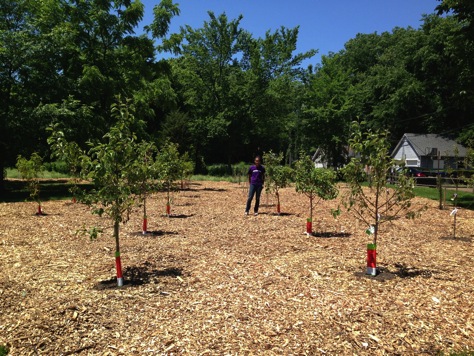
There is now a vegetable garden located on the Northwestern campus behind the Institute for Policy Research at 2046 Sheridan Road. Brady Scholars constructed twelve 2’ x 10’ garden boxes and filled them with compost and seeds. Beets, lettuce, green beans, and tomatoes were planted. Before the winter of 2013-14, a hoop house (modified greenhouse) will be built.
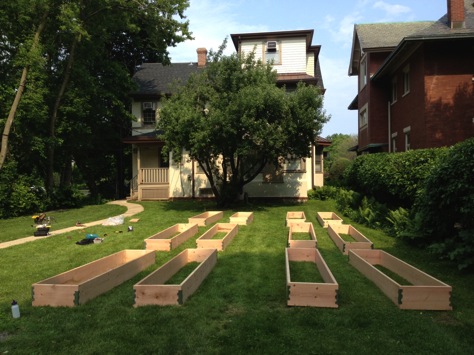
The investment our Brady Class of 2013 has made to the City of Evanston will continue with the support of several student groups on campus. The Brady Class of 2014, Lending for Evanston and Northwestern Development, Northwestern Community Development Corp., Engineers for a Sustainable World, and Environmental Campus Outreach have agreed to sustain this work. Wild Roots has also expressed an interest in partnering with Brady Scholars to expand the Norris garden. The ASG Sustainability Committee is contributing resources to
Good relationships with the citizens of Evanston have been established and will continue to grow as a result of this project. We are confident that future classes of Brady Scholars will sustain them. – Congratulations to Brady ’13!
Senior Project 2012
For its senior project, the Class of 2012 tackled a concrete problem related to the often strained relationship between the Evanston and Northwestern Communities. Over the summer of 2011, Evanston Citizens for Environmental Justice approached then Director of the Brady Program, Laurie Zoloth seeking Brady Students' help with the citizen group's Waste Transfer Station campaign. The group's goal is to educate neighbors, the media, and local, state and federal representatives of the damaging effects of the Evanston Veolia Waste Transfer Station, operating one block from Evanston Township High School, across the street from Mason Park, and next door to residential homes.
The Class of 2012 urged the University Administration to make the avoidance of the Veolia Evanston Transfer Station a condition for all future waste management contracts with the region's haulers. They argued that taking this feasible, socially responsible step, the University's relationship with the Evanston community would be greatly improved. It would also demonstrate Northwestern's commitment to environmental sustainability and social justice.
Brady Scholars 2012 White Paper
Senior Project 2011
The Brady Scholars, Class of 2011 perceived a lack of community engagement among Evanston’s residents as the central challenge faced by the City. They hypothesized that if citizens became involved in the city governance structure, their voices would be heard and desired changes would be possible. The Scholars focused on getting citizens involved – specifically, the citizens of Evanston’s fifth ward, a deteriorating neighborhood on the City’s west side.
Brady ’11 composed a survey to learn about how these residents saw their neighborhood—its strengths, weaknesses, problems, and solutions. One hundred ten completed surveys were collected from local churches, from a community center, and from polling places on Election Day. The results were clear. Residents felt a lost sense of community, alienation from parks and other public spaces, concerns about idle teens gathered in public spaces, and fear of crime and gangs.
The Brady Scholars also considered the disturbing facts put forth by Evanston Mayor Elizabeth Tisdahl. The city’s homicide rate had doubled in just one year. To understand the problem better, Brady Scholars met with Evanston middle school and high school superintendents. Both suggested that engaging young, at-risk students in an academic mentoring program would increase the likelihood that teens will be off the streets, striving toward promising futures that could include college.
Brady ’11 proposed such a mentoring program to receptive administrators and faculty at Evanston Township High School (ETHS), who agreed to support the program. ETHS faculty, staff
We organized meetings with ETHS freshmen at a series of three events spread across the month of May—Shadow Day, Leadership Day, and Community Service Day.
Shadow Day introduced the high school freshmen to college life. They followed their Brady mentors through a typical day at NU. They attended classes and lectures, visited residence halls, went to meetings, had meals in dining halls, and observed the structure of campus life. They enjoyed the food, the beauty of the campus, the facilities, and the Brady students. They were not pleased with the “boring lectures”, the long walks across a sprawling campus, and the feeling that they didn’t belong. They
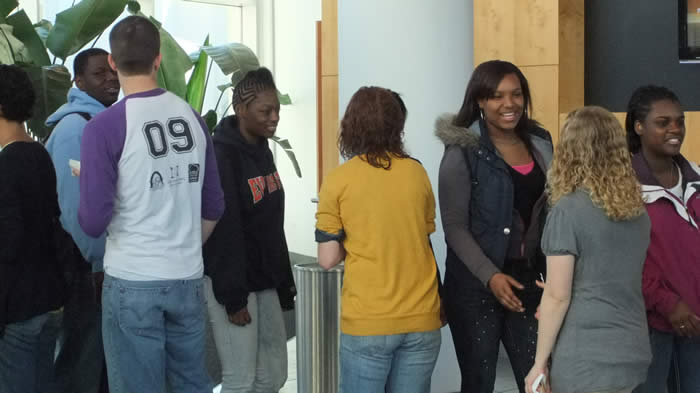
ETHS Students arrive for Shadow Day where they are introduced to the
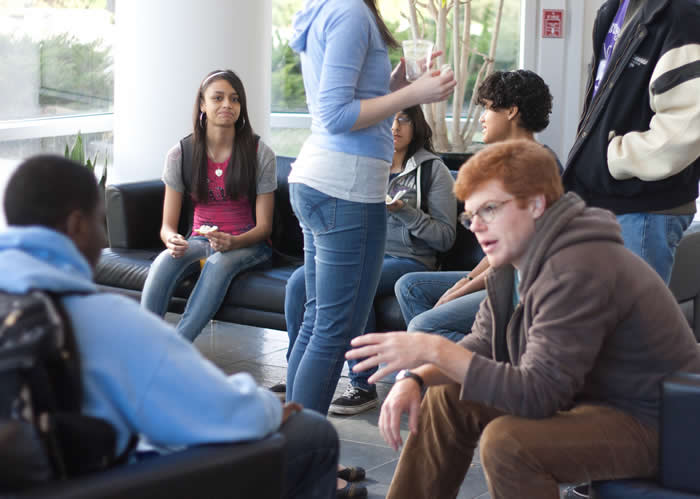
Brady Scholars were surprised at the centrality of race and class among the students—not only the divisions between the young students and the Brady
The agenda for Leadership Day was full. NU Football Coach, Pat Fitzgerald, delivered an inspirational talk that won the attention and respect of the high school freshmen. They participated in an open discussion about violence in their community, which centered on the recent news of an ETHS student who was shot by a peer not far from
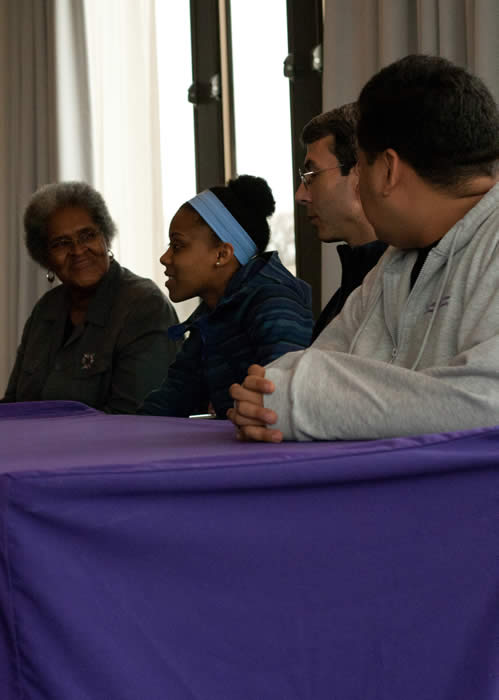
Alderman Delores Holmes, Father John Kartje, Chaplain
Alongside Brady Scholars, students completed projects at four sites: two Evanston parks where eleven trees were planted; New Leaf Urban Gardens/Boocoo Cultural Center, where they worked in the community garden and set up a library wall of donated books; and at Family Focus, a free store stocked with donated clothes for the poor. After a full day’s work, they returned to campus for a closing ceremony where they received certificates, congratulations, and a challenge from Mayor Tisdahl and President Schapiro. They were encouraged to set high goals, continue to serve their community, and apply for admission to Northwestern University, Class of 2018.
The Brady Class of 2011 made a difference in the lives of fourteen children, and
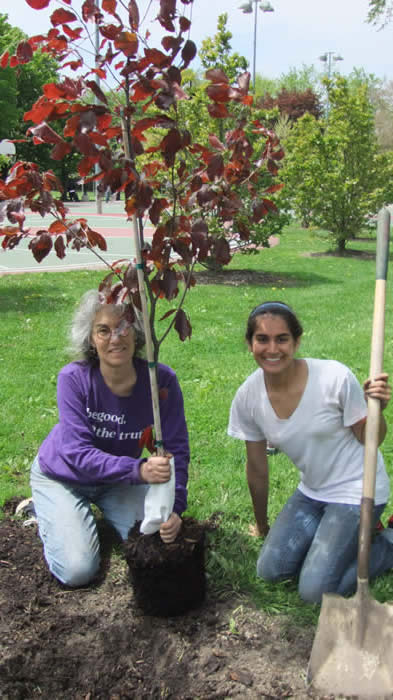
Brady Inaugural Director, Laurie Zoloth is joined by the first class of graduating Brady Scholars and ETHS students, planting eleven trees in each of two Fifth Ward parks
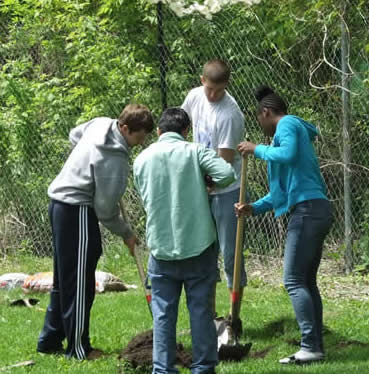
The community garden on Evanston's west side, New Leaf, is managed by Cozeake Nelson
